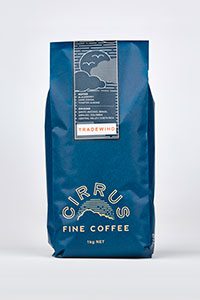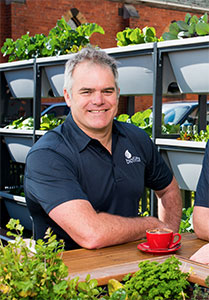If we time travel to the year 2020, what would the modern age café look like? Would there be robotic baristas, self-serving espresso machines, and Willy Wonka inspired installations? Many would argue this outlook is already underway. But what about an eco-friendly café?
According to Brendan Condon, Director of Cirrus Coffee and Australian Ecosystem, it’s likely that cafés will be operating with 100 per cent renewable energy generated at source or purchased over the grid. Chefs would be cooking on induction cooktops rather than gas, and coffee grounds and food waste will be cycled into cafés’ own pop-up farms. Single-use coffee cups will also be eliminated or at the very least, made of only 100 per cent compostable and sustainable materials.
“It may seem like a long way into the future, but it’s not. The market is hungry for sustainable options and it’s not out of reach,” Brendan says. “It won’t be long until we see cafés as specialty coffee destinations but also models of sustainable practices.”
That’s where Cirrus Fine Coffee comes in. For the past 12 years, the roaster, formally known as Red Star Coffee, has served the Australian café community with its trademark small-batch roasted and specialty-grade coffee. Despite its success, Brendan and his team, including newly appointed General Manager Jeremy Boxall, felt it was time to revitalise the brand and encourage customers to reconsider its quality coffee offering and accompanied passion for sustainability.
“First and foremost, we produce great-tasting specialty coffee, backed with excellent customer service,” Brendan says.
Cirrus Fine Coffee uses sustainably sourced beans from the world’s most famous coffee growing regions. About half of its coffee is sourced directly from a small coffee cooperative in Giraldo in Colombia, where it purchases a significant percentage of its entire crop each year. In addition, Cirrus pays the farmers a social dividend to invest in social and community initiatives.
Over the next 12 months, Red Star Coffee customers will welcome Cirrus Fine Coffee into their venues, with the same high quality they’ve come to expect, but with a new contemporary look to align with its passion for high sustainable standards.
This starts with the name transition to Cirrus, which represents the patterned feathery clouds that surround the world’s high-altitude mountains. It’s at this high altitude where the best coffee is grown, and rainfall and cooler temperatures sustain and grow the coffee crops. Cirrus’ range of blends have also had a name overhaul to represent wind patterns, such as Tradewind featuring Brazil, Colombia and Costa Rican beans.

“Sustainability has always been in our DNA,” Brendan says. “We’ve been committed to sustainability, environmental best practice, and ethical sourcing, but we feel the market is only now starting to appreciate these things as defining points of difference in selecting a coffee roaster.”
Those points of difference include Cirrus’ commitment to compostable packaging. Its coffee is now packed into convex compostable bags with biodegradable labels. It uses compostable takeaway cups through TreeFree and Biopak, and it supports zero waste reusable cups with stock of Frank Green, Keep Cup, and Huskee coffee cups.
Cirrus is also passionate about its relationship with Reground, a local initiative that collects coffee grounds from Cirrus cafés and repurposes them as compost into community gardens. Cirrus supports its clients in joining the Reground program and funds ongoing costs. To date, Reground has saved 154 tonnes of ground coffee from landfill.
“More than 60,000 tonnes of coffee grounds are produced annually in Australia, most of which currently ends up in landfill, creating greenhouse gases as it breaks down,” Brendan says. “By diverting it through composting, it is a wonderful soil conditioner for growing food.”
Cirrus also encourages the upcycling and reconditioning of espresso machines to avoid unnecessary wastage. It works with Specht design and Boiling Point technicians to refurbish coffee machines and give them a new lease of life.
At its own headquarters in Port Melbourne, Cirrus reuses all its own coffee grounds at compost in its pop-up urban farm. Thanks to the extra caffeine hit, an abundant supply of herbs and vegetables are thriving. Coffee husks are also repurposed into bricks to fuel the wood fire pizza oven on Fridays.
The office operates on 100 per cent accredited green energy sourced from Victorian wind and solar farms. Thanks to Cirrus’s three sister companies Brendan established more than 20 years ago – Australian Ecosystems, Biofilta, and The Cape – Cirrus customers have direct assess to services that can provide the environmental solutions for cafés.
“We are now in a position to transfer our knowledge, expertise, and sustainable practices to the café market, and move to a more environmentally friendly footing,” Brendan says.
He is optimistic that it’s just a matter of time before we see zero emission cafés, and through The Cape housing development at Cape Paterson near Phillip Island, it’s already happening.
The Cape uses local builders and sustainability experts to create zero-emission, energy-efficient homes with low environmental impact. The residential community is making news headlines for its ability to eliminate energy bills.
To build sustainable landscapes, Australian Ecosystems collects seeds from wetlands and forests and grows up to several million plants at its Carrum Downs nursery in Victoria for land restoration and wetlands projects.
To drought-proof our cities, Cirrus’ other sister company Biofilta is building large-scale stormwater harvesting systems to capture and filter hundreds of millions of litres of rainwater runoff each year, diverting the water into local parks and community gardens.
It also produces modular, low-maintenance pop-up farms made from wicking garden beds that store water and reduce weeds. Brendan says this is a perfect garden solution for cafés with limited space to grow vegetables. In the next few years, he looks forward to helping Cirrus café clients design and install small-scale pop-up farms and edible landscapes at their sites.
“We know that cafés are time poor. We know that in order for more businesses to uptake sustainable solutions, we have to make it efficient for them. It has to be easy to get involved, easy to maintain, and cost effective,” Brendan says.
“If we can provide them with access to award-winning landscape designers, consultation and advice on energy efficient, zero emission fit-out, businesses can embrace the definition of sustainability not just through the coffee they drink, but in their daily operations in a revenue neutral or positive way.”
With a global population increasing rapidly and climate change making agricultural production harder, Brendan says there’s no time to wait.
“If we don’t get a handle on these mega problems of climate change and food and plastic waste, it will become the largest challenge to the viability of our whole industry. Consumers, the public and coffee growers are pushing for solutions.”
Ten years ago Brendan says sustainable options were considered “too complex and costly”. But now, the cost of energy has doubled, solar panels have dropped in price by 90 per cent, and the gap between sustainable practices versus the old way of doing things has disappeared.
“We want to be an example to the coffee community that coffee doesn’t just have to be sustainable, our actions can be too,” Brendan says. “We are on the verge of a really exciting uplift to low footprint, closed loop, circular economy living – all the solutions are at our fingertips.”
For more information, visit www.cirrusfinecoffee.com.au





